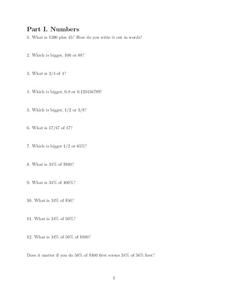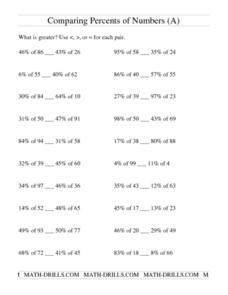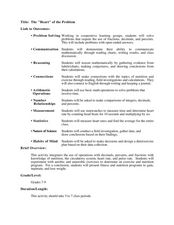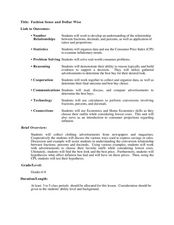California Department of Education
Plagiarism is Stealing!
Stop, thief! Do your pupils understand the consequences of plagiarism? Lesson three of six in a series of college and career readiness activities demonstrates the dangers of taking credit for someone else's work. Learners engage in...
Curated OER
Thinking About Technology: What Is It? How Can It Help Us?
What is technology and how can it help us? Using a worksheet, students read a list and choose practical applications of scientific knowledge, brainstorm examples of home, school and hospital technology, graph answers in a pie chart, and...
Curated OER
One Survivor Remembers: Anti-Semitism
Students analyze and discuss how propaganda influenced anti-Semitism and it's role in World War II. For this propaganda lesson, students define the terms involved in this assignment. Then they will discuss their reactions to a film and...
Curated OER
Data Management and Probability: Applications
In this data management and probability applications activity, 7th graders solve 13 different types of problems that include finding the mean, median, mode, and range of each set of values, as well as, solving a number of word problems....
Curated OER
Numbers
In this interest worksheet, students calculate interest and percentages of numbers in number and word problems. Students complete 29 problems.
Curated OER
Hot shots 1
Students recognize the simple percentages equivalent to ?? or ?? etc, and their equivalent value as decimals. They work independently of the teacher to practice number properties. Answer key included.
Curated OER
Decimals, Fractions and Percentages
In this arithmetic worksheet, 6th graders solve and complete 40 problems. First, they find the value of a number in each decimal listed. Then, students write each list of numbers in order from least to greatest. They also write the...
Curated OER
Percentages: Calculating Percent-1
In this percentages worksheet, students calculate percentages in eighteen problem solving percentage equations. Students show each step of their work.
Curated OER
Comparing Percents of Numbers (A)
In this inequalities practice worksheet, students use their math skills to compare 20 pairs of 3 percentage problems. Students solve the problems and fill in the blanks with greater than, less than, or equal to symbols.
Teach Engineering
Enough Energy? Play the Renew-a-Bead Game
Pairs simulate the energy usage of different countries by drawing beads from a bag, which contain different beginning ratios of non-renewable and renewable energy resources. The activity concludes with a series of questions to tie...
Florida Center for Reading Research
Fluency: Letter Recognition, Speedy Alphabet Arc
On your mark, get set, match! Learners use a complete set of letters, matching each to its outlined letter on an arc. As they choose letters, they name them aloud. For added difficulty, another arc is missing most of its letters to...
EngageNY
Why Do Banks Pay YOU to Provide Their Services?
How does a bank make money? That is the question at the based of a lesson that explores the methods banks use to calculate interest. Groups compare the linear simple interest pattern with the exponential compound interest pattern.
Cornell University
Radical Reactions
The radical reactions of polymers seems abstract to many pupils, but this lesson turns them into a fun building game. Scholars use dice and building pieces to build polymers. Then, they determine the theoretical and experimental weight...
Scholastic
Study Jams! Rounding Decimals
Jeans length is a hot topic for preteens, and in this lesson, Mia helps us figure out how to round the length of various pairs so that Zoe can get some as close to 32.45 inches as possible. She uses a number line or ruler to prove the...
Balanced Assessment
Oil Consumption
An assessment presents a chart displaying oil consumption Pupils use the chart to determine the greatest increase in consumption, and then apply that information to figure out when the consumption may reach 100 million barrels a day.
CK-12 Foundation
Data Summary and Presentation: Chart for Grouping Data
Get social! Create a display of social media use for a class. Pupils use provided information about the time spent on social media to construct a histogram. Using the histogram, learners interpret the data to answer questions.
Curated OER
The "Heart" of the Problem
Learners explore mathematical operations while studying nutrition. In this physical fitness lesson, students explore calories, pulse rate, and the circulatory system. Learners use mathematical data to create a healthy physical fitness...
Curated OER
Fashion Sense and Dollar Wise
Students find the cost of an outfit. In this percentages lesson, students look at ads, pick out an outfit, and find the sale price. They create a commercial and complete 4 included worksheets.
Curated OER
A Fraction of the Possibilities
Students review the conversion of fractions to decimals, develop strategies to compare fractions perform complex calculations using ratio techniques similar to the construction of fractions.
Curated OER
What Can We Measure About Chemicals?
In this measurement worksheet, learners read about accuracy of measurements as compared to the precision of measurements. Students answer four precision problems and solve four accuracy problems.
Curated OER
Formulas from Masses
In this mass learning exercise, students determine the percentage composition of given compounds. Students write the empirical formula from the percentage composition. This learning exercise has 5 problems to solve.
Curated OER
Aboriginal Statistics
Fourth graders analyze statistics of Native Americans by creating graphs. For this data analysis lesson, 4th graders define different statistical terms and practice finding those statistics from groups of numerical information...
Curated OER
Peter Rabbit Meets Charles Darwin
Students start to think of evolution in terms of populations. The class follows a cartoon scenario of a rabbit population in which there is selection and change of gene frequency. They receive copies of the scenario or the whole thing...
Curated OER
Fall Plowing: Drawing to Scale
Middle schoolers explore coordinates and scale drawings. In this drawing to scale lesson, students discuss symmetrical and asymmetrical shapes, geometric, shapes and estimation of size. Middle schoolers recreate a portion of a...
Other popular searches
- Finding Percent of a Number
- Calculate Percent of a Number
- Finding Percent Part Whole
- Percent of Whole Numbers
- Percent of a Whole Number
- Find the Percent of a Number
- Finding Percent of Number
- Percent of Numbers
- Finding a Percent of a Number
- Percent Number Puzzles
- Percent of a Whole
- Percent Number Line

























